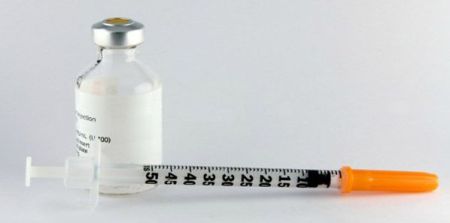A team of bioengineers from ETH Zurich's Department of Biosystems Science and Engineering (D-BSSE) in Basel, Switzerland, have developed an implantable molecular device that is composed of two modules: a sensor that can measure blood pH constantly, and a gene feedback mechanism that produces the necessary amount of insulin. Both modules have been constructed from biological components, such as genes and proteins, and have then been incorporated into cultivated renal cells. The team of researchers has embedded millions of these cells in capsules so that they can be used as implants in the body.
The primary feature of this new device is the pH sensor, able to measure the blood's precise acidity. It is sensitive to even minor changes from the ideal pH value. In most cases, normal human blood pH values lie between 7.35 and 7.45. In case the pH falls below 7.35, the sensor will transmit a signal to trigger the production of insulin.
Most proteins cease to function normally if fluids in the body become acidic. They can also become unstable and alter the structure or interactions with other proteins, causing other metabolic pathways to break down. Low pH is specific for type 1 diabetes and can also drop due to alcohol abuse or exercise that results in over-acidification of muscles. However, it does not fall below 7.35.
If this happens, the hormone insulin, which is triggered, ensures that normal cells in the body start to absorb glucose again and switch from fat to sugar as their primary energy source for metabolism. The pH value thus rises and returns to the ideal range, and the senor turns itself off with the reprogrammed cell no longer producing insulin.
The sensitive acid sensor has already been tested on mice with type 1 diabetes and related acidosis. The results seem promising and the test samples did produce the amount of insulin that was appropriate for their individual acid measurements. "Applications for humans are conceivable based on this prototype, but they are yet to be developed," says Martin Fussenegger. "We wanted to create a prototype first to see whether molecular prostheses could even be used for such fine adjustments to metabolic processes," he says.
Three groups from the D-BSSE have worked together on this particular project. Martin Fussenegger and his team of researchers who developed the genetic network; Professor of Biosystem Engineering Andreas Hierlemann and his team who tested the acidity sensor with the aid of microfluidic platforms; and Jorg Stelling, Professor of Computational Systems Biology, who modelled it to estimate the dynamics of the insulin production.
However, actually preparing this product for the market is beyond the scope of this team and can only be pursued in collaboration with an industrial partner.
Source: Eurekalert!
The primary feature of this new device is the pH sensor, able to measure the blood's precise acidity. It is sensitive to even minor changes from the ideal pH value. In most cases, normal human blood pH values lie between 7.35 and 7.45. In case the pH falls below 7.35, the sensor will transmit a signal to trigger the production of insulin.
Most proteins cease to function normally if fluids in the body become acidic. They can also become unstable and alter the structure or interactions with other proteins, causing other metabolic pathways to break down. Low pH is specific for type 1 diabetes and can also drop due to alcohol abuse or exercise that results in over-acidification of muscles. However, it does not fall below 7.35.
If this happens, the hormone insulin, which is triggered, ensures that normal cells in the body start to absorb glucose again and switch from fat to sugar as their primary energy source for metabolism. The pH value thus rises and returns to the ideal range, and the senor turns itself off with the reprogrammed cell no longer producing insulin.
The sensitive acid sensor has already been tested on mice with type 1 diabetes and related acidosis. The results seem promising and the test samples did produce the amount of insulin that was appropriate for their individual acid measurements. "Applications for humans are conceivable based on this prototype, but they are yet to be developed," says Martin Fussenegger. "We wanted to create a prototype first to see whether molecular prostheses could even be used for such fine adjustments to metabolic processes," he says.
Three groups from the D-BSSE have worked together on this particular project. Martin Fussenegger and his team of researchers who developed the genetic network; Professor of Biosystem Engineering Andreas Hierlemann and his team who tested the acidity sensor with the aid of microfluidic platforms; and Jorg Stelling, Professor of Computational Systems Biology, who modelled it to estimate the dynamics of the insulin production.
However, actually preparing this product for the market is beyond the scope of this team and can only be pursued in collaboration with an industrial partner.
Source: Eurekalert!
Latest Articles
diabetes, Technology, Medical Devices, type 1 diabetes, insulin, implantable device
A team of bioengineers from ETH Zurich's Department of Biosystems Science and Engineering (D-BSSE) in Basel, Switzerland, have developed an implantable mol...



























